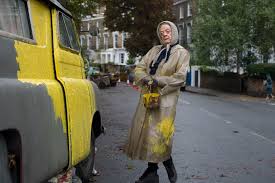OUT OF GAS: Movie Reviews of The Lady in the Van and Aferim! by Howard Casner
Posted: February 7, 2016 | Author: Donald | Filed under: Uncategorized | Tags: Aferim!, Alan Bennet, Alan Bennett, Alex Jennings, Florin Lazarescu, James Corden, Jim Broadbent, Maggie Smith, Marius Panduru, Nicholas Hytner, Radu Jude, Teodor Corban | 5 Comments »First, a word from our sponsors: I am now offering a new service: so much emphasis has been given lately to the importance of the opening of your screenplay, I now offer coverage for the first twenty pages at the cost of $20.00. For those who don’t want to have full coverage on their screenplay at this time, but want to know how well their script is working with the opening pages, this is perfect for you. I’ll help you not lose the reader on page one.
Ever wonder what a reader for a contest or agency thinks when he reads your screenplay? Check out my new e-book published on Amazon: Rantings and Ravings of a Screenplay Reader, including my series of essays, What I Learned Reading for Contests This Year, and my film reviews of 2013. Only $2.99. http://ow.ly/xN31r
and check out my Script Consultation Services: http://ow.ly/HPxKE
Warning: SPOILERS
 Forgive me if I start out with a pun to describe the new comedy The Lady in the Van. It’s basically little more than a vehicle for the legendary actress Maggie Smith. To add insult to injury, I’ll continue with another pun: it’s a pretty stalled vehicle when all is said and done.
Forgive me if I start out with a pun to describe the new comedy The Lady in the Van. It’s basically little more than a vehicle for the legendary actress Maggie Smith. To add insult to injury, I’ll continue with another pun: it’s a pretty stalled vehicle when all is said and done.
The cental premise is based on something that sorta, kinda happened to the British playwright Alan Bennett (The History Boys, The Madness of King George). After striking up a conversation with the neighborhood bag lady who lives in her van, and after not being able to shake her off, the playwright acquiesces to her suggestion that she park her vehicle in his driveway. He agrees, more out of an inability (or cowardice as he describes it) to say no. It’s only supposed to be for a little while, but she stays there until she dies fifteen years later.
Even though this is a vehicle for Maggie Smith, she is only fitfully effective, and I think that this may be because her character is more a construct than a real person. I mean, Bennett’s bag lady here is not your run of the mill everyday type of bag lady. No, here she is a former concert pianist and ex-nun who has gone into hiding because she thinks she is responsible for the death of a motorcyclist (she’s not) and who is being blackmailed by a police officer. Read the rest of this entry »
Movie Review of EVERYBODY IN OUR FAMILY by Howard Casner
Posted: November 3, 2012 | Author: Donald | Filed under: Uncategorized | Tags: Corina Sabau, Everybody in Our Family, Radu Jude | 3 Comments »Everybody in Our Family is a new Romanian film directed by Radu Jude, who also penned the screenplay along with Corina Sabau. It’s about a divorced man who arrives to pick up his five year old daughter for a pre-arranged weekend visit, only to find his ex-wife not home and his mother-in-law and the man who’s replaced him in his wife’s life refusing to let him have his daughter because they claim she’s ill. When the wife gets home, police are called and matters get out of hand (you know, sort of like that fire started by O’Leary’s cow getting out of hand).
Have you ever been at a restaurant or coffee shop and a couple at a nearby table is having a knock down, drag out? You can’t look away, but at the same time, you have no context for the argument so nothing they say really makes enough sense or gives you the information you need to understand the conflict. So in the end, the whole thing becomes just kind of uncomfortable and embarrassing. That’s what watching this Eastern European Kramer v. Kramer is like. It’s a series of arguments and actions presented without enough of that all important context to really have an emotional stake in what’s going on.
Everybody in Our Family is very sincere (that’s one thing you can definitely say about it) and no one gives a bad performance, but it has little else to really recommend it. From a pacing standpoint, it feels a bit clunky (it takes forever for the other shoe to drop—we call it the inciting incident in screenplay patois) and then when the central character makes a fateful decision toward the end, it’s so fateful, there’s no place for the movie to go, and worse yet, it takes forever not to go there. It’s so fateful, and dramatized in such an over the top way (a few times, the characters tell the others to stop acting like they’re in a soap opera, which is something one wishes someone had told the writers and director) there’s no satisfactory way this movie could resolve itself. And sure enough, the authors paint themselves into such a corner that the whole thing ends, well, unsatisfactorily.











